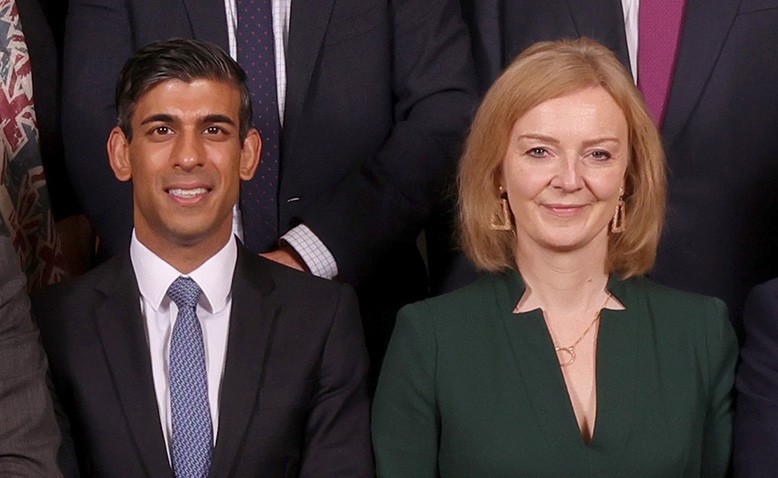 Rishi Sunak and Liz Truss. Photo: Andrew Parsons / No 10 Downing Street / Flickr / cropped from original / CC BY-NC-ND 2.0, license linked below article
Rishi Sunak and Liz Truss. Photo: Andrew Parsons / No 10 Downing Street / Flickr / cropped from original / CC BY-NC-ND 2.0, license linked below article
Following their recent TV debates, Terina Hine explains why Rishi Sunak and Liz Truss represent more of the same, but with a notable shift to the right
With all the talk of who is winning in the TV debates, it is clear the real losers are us. On Monday it was the Sunak vs Truss show on BBC primetime, Tuesday it was the turn of TalkTV, although the debate was cut short as the presenter fainted on set. No doubt a relief for many.
Who would have known that the country is in crisis. The NHS is on life support; we are witnessing a summer of strikes; the population is trapped, unable to get passports or board ferries, and flights are cancelled daily; wildfires threatened the capital last week and now there are emergency meetings to prepare for a major drought. The country is crumbling, but regardless, almost five minutes of Monday’s debate was spent discussing fashion: in the absence of policy there’s always Prada.
Sunak’s mansplaining overshadowed any content, and must certainly have cost him dearly in votes. One report suggested the former chancellor interrupted his female rival 22 times in the first 12 minutes. So much for his brilliant debating skills and more professional TV persona.
The interruptions were so frequent, so condescending and so rude it was impossible to hear what he said. It served only to emphasise his billionaire arrogance and entrenched sense of superiority. Not a good look when the audience was made up of Tory red wall voters, but it provides plenty of ammo for the culture war Truss is provoking.
The only real division between the two would-be leaders is on tax: the promises of cuts now or cuts later. On Monday, Sunak called Truss’ proposed tax cuts immoral, although after seeing the polling (he is trailing on all metrics) he announced a “screeching U-turn” in the form of a temporary tax cut worth £4.3 billion. Temporary is doubt less immoral than the permanent cuts offered by his rival.
On everything else, except perhaps where to shop, the candidates represent more of the same, but with a notable shift to the right.
On foreign policy they attempted to outgun each other in anti-China rhetoric. For the summer of strikes they unified to promote agency scabs and union-busting policies. One Thatcher tradition the two can agree on. If Truss is the victor, strikes would effectively be outlawed.
Ideas for combatting climate change amounted to little more than tinkering with household recycling, and a suggestion for families to reduce food waste and electricity use. On rapidly-rising energy bills they offer almost nothing. According to reports, the energy price cap could go as high as £3,244 in October, so perhaps more people will indeed heed Sunak’s advice and use less electricity – climate policy and cost of living dealt with by a simple click of the switch.
Given what we know of the candidates and the selectorate, none of this should surprise. But the silence on the NHS is puzzling. After all, it is an institution supported and relied on by the ageing Tory members who matter in this election. Plus on Monday a major report was published by the Commons health and social care select committee which concluded the NHS faces “the greatest workforce crisis” in its history, putting patients as serious risk.
Boris Johnson’s “oven-ready plan” to deal with social care and his hospital building promises may have lacked any substance and been nothing more than words in the wind, but it was a wind directed at this Tory constituency as much as at the wider public. In this election the candidates prefer to avoid the subject as much as possible, and failed to mention it once during the debate on the BBC. Why neither Chris Mason nor Faisal Islam saw fit to raise the issue is a deeper mystery.
The BBC used its platform to showcase the Tory right with no attempt to show an alternative or hold a proper interrogation of policy – even with two of its most senior journalists present. There was no attempt at balance. The Overton window is being pushed further right on primetime television.
Sunak leads the polls among Labour voters, is fractionally ahead among the wider population, but his performance on Monday will have done him no favours, and Conservative members are unlikely to be swayed to his camp by a belief he could win in a general election. The time for Sunak to close the gap is rapidly running out – belated promises of tax cuts unlikely to convince many.
So Truss remains in the lead with the voters that matter. Having Jacob Rees-Mogg and Nadine Dorries as her loudest cheerleaders says all you need to know about where she stands. “She is the adoptive child of the ERG [European Research Group] and all the other batshit groups on the right of the party,” said one Tory MP who also describes himself as a man of the right, just not quite that far right.
It is an utter disgrace that our next Prime Minister is chosen in this way.
Join Revolution! May Day weekender in London
The world is changing fast. From tariffs and trade wars to the continuing genocide in Gaza to Starmer’s austerity 2.0.
Revolution! on Saturday 3 – Sunday 4 May brings together leading activists and authors to discuss the key questions of the moment and chart a strategy for the left.

